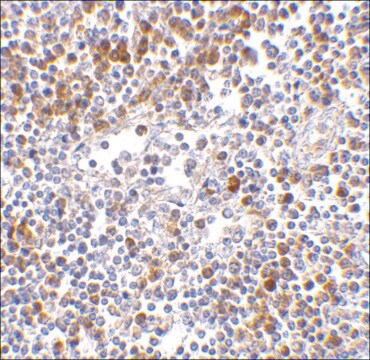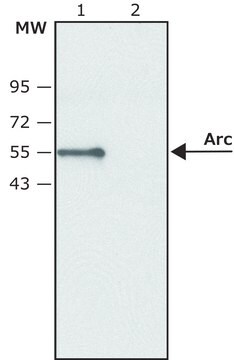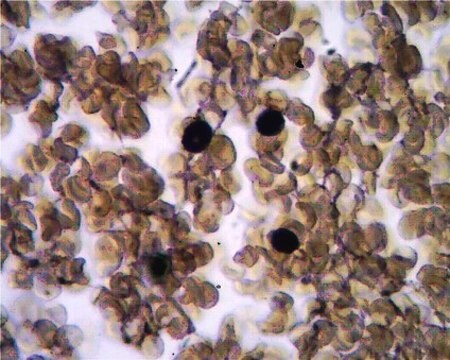ABF210
Anti-MDA5 Antibody
from rabbit, purified by affinity chromatography
Synonym(e):
MDA5 Antibody, Melanoma differentiation-associated protein 5, Interferon-induced with helicase C domain protein 1, IFIH1
About This Item
Empfohlene Produkte
Biologische Quelle
rabbit
Qualitätsniveau
Antikörperform
affinity isolated antibody
Antikörper-Produkttyp
primary antibodies
Klon
polyclonal
Aufgereinigt durch
affinity chromatography
Speziesreaktivität
human
Methode(n)
immunofluorescence: suitable
immunohistochemistry: suitable (paraffin)
western blot: suitable
UniProt-Hinterlegungsnummer
Versandbedingung
wet ice
Posttranslationale Modifikation Target
unmodified
Angaben zum Gen
human ... IFIH1(64135)
Allgemeine Beschreibung
Spezifität
Immunogen
Anwendung
Entzündung & Immunologie
Immunoglobuline & Immunologie
Immunofluorescence Analysis: 20 μg/mL from a representative lot detected MDA5 in human lymph node cells.
Qualität
Western Blotting Analysis: 2 µg/mL of this antibody detected MDA5 in 15 µg of Daudi cell lysate.
Zielbeschreibung
Verlinkung
Physikalische Form
Lagerung und Haltbarkeit
Hinweis zur Analyse
Daudi cell Lysate
Sonstige Hinweise
Haftungsausschluss
Sie haben nicht das passende Produkt gefunden?
Probieren Sie unser Produkt-Auswahlhilfe. aus.
Lagerklassenschlüssel
12 - Non Combustible Liquids
WGK
WGK 2
Flammpunkt (°F)
Not applicable
Flammpunkt (°C)
Not applicable
Analysenzertifikate (COA)
Suchen Sie nach Analysenzertifikate (COA), indem Sie die Lot-/Chargennummer des Produkts eingeben. Lot- und Chargennummern sind auf dem Produktetikett hinter den Wörtern ‘Lot’ oder ‘Batch’ (Lot oder Charge) zu finden.
Besitzen Sie dieses Produkt bereits?
In der Dokumentenbibliothek finden Sie die Dokumentation zu den Produkten, die Sie kürzlich erworben haben.
Unser Team von Wissenschaftlern verfügt über Erfahrung in allen Forschungsbereichen einschließlich Life Science, Materialwissenschaften, chemischer Synthese, Chromatographie, Analytik und vielen mehr..
Setzen Sie sich mit dem technischen Dienst in Verbindung.






![3-(3-((7-(tert-Butoxycarbonyl)-7-azaspiro[3.5]nonan-2-yl)oxy)piperidin-1-yl)propanoic acid](/deepweb/assets/sigmaaldrich/product/structures/260/697/2527aa6d-8353-4697-aa99-0de8f5b6eae9/640/2527aa6d-8353-4697-aa99-0de8f5b6eae9.png)

